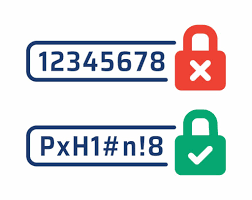Protecting Your Digital Identity in 2025
In 2025, cybercriminals are smarter, and online scams are more sophisticated than ever. From AI-powered deepfakes to data breaches, your digital identity is constantly at risk. This blog covers essential cybersecurity tips to safeguard your personal information, including password management, social media privacy, financial security, and more. Learn how to stay safe, avoid scams, and protect your online presence in the evolving digital landscape.
TECH TALES
Deepita
3/19/20253 min read


Imagine waking up one morning, checking your email, and discovering that your bank account has been drained or your social media accounts have been hacked. Scary, right? Well, this is no longer a rare scenario. In 2025, cybercriminals are smarter, scams are more sophisticated, and your digital identity is more vulnerable than ever.
With AI-powered phishing attacks, deepfake scams, and large-scale data breaches becoming increasingly common, protecting your personal information has never been more important. A weak password or a careless social media post could be all it takes for someone to steal your identity.
In this article, you’ll discover practical tips to safeguard your digital presence, stay ahead of emerging cyber threats, and protect what matters most—your privacy.
1. Strengthen Your Password Game (No More ‘123456’)
Weak passwords are like leaving your front door unlocked—it makes you an easy target. In 2025, AI-powered tools can crack basic passwords in seconds, making it essential to use strong, unique passwords for each account.
🔹 Tips for Stronger Password Security:
Use at least 12-16 characters with a mix of uppercase, lowercase, numbers, and symbols.
Never reuse passwords across platforms—if one account is breached, the others become vulnerable.
Use a trusted password manager (like LastPass, 1Password, or Bitwarden) to generate and store complex passwords securely.
Enable two-factor authentication (2FA) on all important accounts for an added layer of protection.
Opt for biometric authentication (fingerprint, facial recognition) where possible—it’s harder to replicate.
2. Be Cautious of AI-Powered Scams & Deepfakes
In 2025, AI-generated scams and deepfakes have become alarmingly realistic. Scammers can clone voices, create fake videos, and impersonate people you trust, making fraud harder to detect.
🔹 How to Stay Safe:
Verify suspicious calls or messages—even if they sound like a friend or colleague.
Use video call verification before transferring money or sharing sensitive information.
Look for signs of manipulation—deepfakes often have subtle glitches (blinking issues, distorted edges).
Don’t click on suspicious links—even if they appear to come from familiar contacts.
If you receive an unusual request, call the person directly to confirm its legitimacy.
3. Keep Your Devices & Software Updated
Using outdated software is like leaving a backdoor open for hackers. Cybercriminals exploit vulnerabilities in old versions to gain unauthorized access.
🔹 How to Protect Your Devices:
Enable automatic updates on your operating system and apps.
Regularly update browsers—they are frequent targets for attackers.
Use trusted antivirus and anti-malware software to scan for threats.
Delete unused apps—they may no longer receive security updates, making them vulnerable.
Turn on firewall protection and restrict app permissions to limit exposure.
4. Use Encrypted Messaging & Privacy-Focused Browsers
In an era of constant surveillance and data tracking, using privacy-focused tools is essential.
🔹 Best Practices:
Use end-to-end encrypted messaging apps like Signal, Telegram, or WhatsApp for private conversations.
Switch to privacy-centric browsers like Brave or Firefox, which block trackers and ads.
Enable DNS-over-HTTPS (DoH) for more secure web browsing.
Consider using a VPN (Virtual Private Network) when accessing public Wi-Fi to mask your IP address.
Don’t send sensitive information (like passwords or payment details) over unencrypted platforms.
6. Be Careful with Social Media Sharing
Oversharing on social media makes it easier for cybercriminals to gather information for phishing attacks or identity theft.
🔹 How to Stay Private Online:
Limit personal information (phone number, address, birthday) on public profiles.
Be mindful of geotagging—sharing real-time locations makes you vulnerable.
Review privacy settings regularly and restrict who can see your posts.
Think before you post: Vacation photos in real time signal that your home is empty.
Pro Tip: Disable facial recognition in social media apps to prevent unauthorized tagging.
In 2025, cybersecurity is no longer a luxury—it’s a necessity. The digital world is evolving, and so are the tactics of cybercriminals. Protecting your digital identity means being proactive, alert, and informed.
By following these tips—using strong passwords, being cautious with financial data, limiting social media exposure, and embracing biometric and multi-factor authentication—you can significantly reduce your risk of falling victim to cybercrime.
Stay vigilant, stay safe, and remember: protecting your digital identity is protecting your future.






